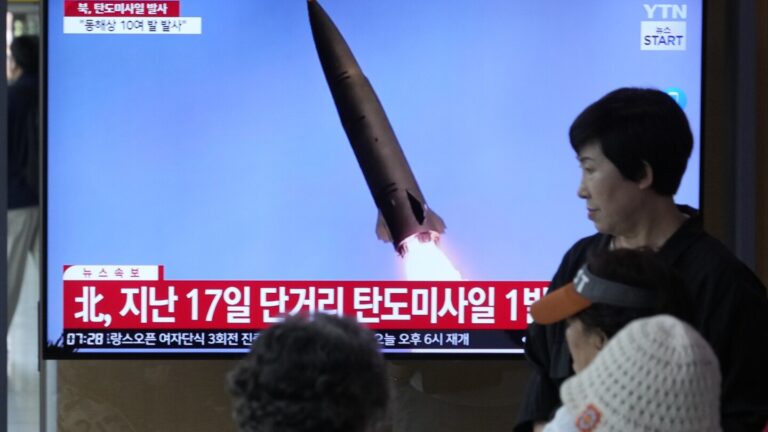SEOUL, South Korea (AP) — North Korea fired what was believed to be a ballistic missile into the sea to its east on Thursday, South Korea’s military said, days after an attempted military reconnaissance mission. The satellite was a failure But it still drew strong criticism from rivals.
South Korea’s Joint Chiefs of Staff said it had confirmed that North Korea had launched about 10 projectiles believed to be short-range ballistic missiles from near the capital, Pyongyang. The missiles flew some 350 kilometers before landing off the east coast of North Korea. The Joint Chiefs said the South Korean military was stepping up surveillance and vigilance and was closely sharing information with the United States and Japan.
Japan’s Coast Guard issued a maritime safety advisory regarding the North Korean missile launch, urging ships to exercise caution if they spot any falling objects. Prime Minister Fumio Kishida told reporters that the suspected missile appears to have landed in waters outside Japan’s exclusive economic zone, and that no damage has been reported at this time. He said Japan “strongly condemns” the launch, which violates UN Security Council resolutions against North Korea.
Tensions have risen on the Korean peninsula in recent months amid an increased pace of North Korean weapons tests and joint military drills with South Korea, the United States and Japan, sparking a tit-for-tat battle.
Thursday’s launch was announced by North Korea Balloons carrying hundreds of pieces of trash North Korea began firing leaflets into South Korea on Tuesday night in retaliation for South Korean activists flying anti-North Korean propaganda leaflets across the border. After North Korea conducted an aerial drill with 20 fighter jets near the inter-Korean border hours before attempting to launch a second military reconnaissance satellite, North Korean leader Kim Jong Un warned of “overwhelming action” against South Korea, but the details of the action were not disclosed.
The rocket exploded shortly after liftoff, but Kim urged military scientists to overcome the failure and continue developing space reconnaissance capabilities, which he said are essential for monitoring U.S. and South Korean military activities and raising the threat of nuclear-capable missiles. North Korea also hit back at international condemnation of a failed satellite launch on Thursday, which drew strong condemnation from the United Nations and other countries because it involved technology used to develop intercontinental ballistic missiles. North Korea successfully launched its first military reconnaissance satellite in November, but Monday’s failure suggested a setback for Kim’s satellite-launch plans. Three more military spy satellites “We will never tolerate any move by hostile forces to violate our inviolable territory for the exercise of sovereignty, and we will not back down on access to space reconnaissance capabilities, which should be ensured no matter what other countries say,” North Korean Vice Foreign Minister Kim Son Kyong said in a statement carried by state media.
Kim Son Kyung’s statement came in response to U.N. Secretary-General Antonio Guterres, who condemned Monday’s launch, saying it violated Security Council resolutions that ban North Korea from conducting any launches involving ballistic missile technology.
Thursday’s launch was the latest in a series of weapons tests by North Korea.
On May 17, South Korea’s military said North Korea had fired what appeared to be a short-range ballistic missile off the country’s east coast. North Korea later said it had tested a tactical ballistic missile equipped with a new autonomous navigation system.
North Korea has tested a range of cruise missiles and artillery systems this year, including flight-testing what it describes as a solid-fuel medium-range missile capable of carrying a hypersonic warhead, which experts say is designed to reach remote U.S. targets in the Pacific, including the military base of Guam.
___
Associated Press writer Mari Yamaguchi in Tokyo contributed to this report.
___
Read AP’s Asia-Pacific coverage here https://apnews.com/hub/asia-pacific

